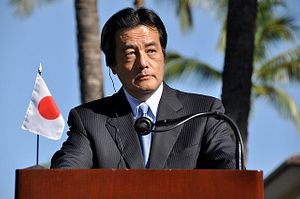Over the last several years, Japan has seen a panoply of new political parties appearing and evaporating. On March 27, this trend culminated in the launching of Minshin-To (Democratic Party, DP), which consolidated the Minshu-To (Democratic Party of Japan, DPJ) and Ishin no-To (Japan Innovation Party).
Though the new party has barely launched, it is already facing a significant challenge: the public’s expectations of the DP are extremely low. According toan opinion poll taken by Kyodo News in late March, a whopping 67 percent of the poll respondents replied that they are not expecting much from the new party, with only 8 percent saying they support the DP.
The DP’s party leadership contributes a great deal to this lack of enthusiasm. The new party’s leadership consists predominantly of former DPJ senior party leaders, reflecting the respective size of the two parties. Katsuya Okada, the former DPJ president, was elected to be DP’s president. Yukio Edano, former Chief Cabinet Secretary between 2010-2012 under DPJ Prime Minister Naoto Kan, assumed the position of DP Secretary-General. Overall, with the exception of Shiori Yamao, whose fame dramatically rose through her tough questions to Prime Minister Shinzo Abe about the shortage of childcare facilities in Japan, the DP’s leadership positions are occupied by the familiar old faces—making the DP’s “fresh start” as a tough-sell from the get-go.
The lack of a clear goal for the DP — beyond “Seiken kotai (change of government)” — also likely aggravates public disappointment. In post-Cold War Japanese politics, Japanese voters have been twice disappointed by emerging opposition parties that drove the ruling Liberal Democratic Party out of power by insisting that Japan needs a change of government. The first time was in 1993, when an eight-party coalition that rallied behind Morihiro Hosokawa of Nihon Shin-To (Japan New Party) won a majority in the Lower House with the campaign slogan of “responsible reform.” The second time was 2009 when the DPJ, led by Yukio Hatoyama, won a majority in the Lower House.
Both times, after taking the government, the opposition force showed a lack of ability to govern. The Hosokawa government, while having succeeded in legislating much-needed political reform, was quickly bogged down by differences over major policy issues among the coalition partners. The DPJ government was consumed first by imposing unreasonable seiji shudo (political leadership) on the bureaucracy, then by the response to the triple disaster caused by the 2011 Great Eastern Japan Earthquake. Although Yoshihiko Noda, who became the prime minister in the summer of 2011, began an attempt to bring meaningful policy changes in national security as well as economic policies (particularly fiscal policies), the DPJ no longer had the public confidence necessary to legislate its intended changes.
Both times, the failure of the change of government was followed by the return of the coalition government led by the LDP. Deep disappointment among the public about the opposition party that had just left the government allowed the LDP-led coalition to stay in power — primarily because of a lack of alternatives. The rhetoric coming out of the new Democratic Party leadership gives the public no reason to expect that this party might evolve into a different kind of opposition party.
In short, the Japanese public has been betrayed twice by a “new” opposition party that calls for a change of government in order to revitalize Japan. After the DPJ, the predominant force behind creating the Democratic Party, thoroughly disappointed the public both through its three year rule and the anachronistic tactics it showed when trying to block Abe government’s security legislation only a year ago, it remains to be seen if the third time will be a charm for them.

































